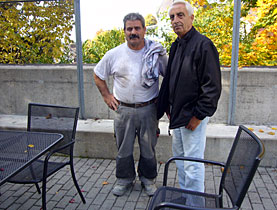
Building a better life after work

Construction workers in Switzerland have been benefiting from an early retirement scheme for the building sector from the age of 60.
Ahead of a nationwide vote on a trade union plan to introduce flexible retirement at 62, swissinfo met Mario Renna and Donato Gemma from Bern. They say it is worth fighting for a long, healthy retirement after their years of hard work.
Their story is the story of thousands of other Italians who came to Switzerland in the 1960s – the years of economic boom and a busy building sector.
Renna was 21 years old when he emigrated from his native Sicily in 1961. He already had considerable professional experience as a bricklayer having left school at the age of 12.
He soon found a job with a construction company in Switzerland, got married and had a daughter with his German wife.
Renna says he has fond memories of his native village of Licodia Eubea, near Catania, but the centre of his life has long since moved to Switzerland.
He says the past decades here have been dominated by work. “I used to leave the house at six in the morning and did not come home until six in the evening,” Renna says.
It meant hard work, physically exhausting and sometimes working in adverse weather conditions.
“When it rains the water trickles down the back of your neck and you get completely soaked,” he recalls.
His life took a turn for the better in August 2003. This is when a flexible retirement scheme for the construction industry took effect.
New life
Renna, who settled in the capital, Bern, was one of the first employees able to benefit from the agreement between employers and employees. It marked the beginning of a second life for him.
At the age of 63 he took up gardening, started growing vegetables, berries, grapes and flowers in his allotment in the city.
Renna is visibly proud of his little green plot. He loves to be outdoors and enjoys the countryside on his strolls.
“I watch the sun rise and set. It is different every time,” he says.
Another hobby of his are books. “When I was working I was too tired to do much reading. I practically fell asleep holding a book in my hand.”
He also began to travel across Switzerland to visit some of the sights of the country, more than 40 years after he arrived here.
Getting ready
Mario’s colleague, 59-year-old Donato Gemma, meets us during his lunch break at a construction site in the city.
He was just 17 when he emigrated from the southern Puglia region in 1966. He anxiously awaits next February when he will be eligible for the early retirement scheme.
Gemma has made plans. He will return to his native Lecce province to build his own home. And like Renna, he too wants to spend time in his garden.
His Swiss wife also looks forward to a new life in the Mediterranean environment and to visits by their children. “Switzerland will become our holiday destination,” she says jokingly.
For his part, Gemma hopes to travel to get to know the city of Naples, but also Spain and South America.
“A cousin of mine invited me to visit him in Brazil,” he says.
Health
Gemma says it is crucial to stay healthy to be able to benefit from early retirement. Nearly one in two construction workers has health problems at the age of 65.
But three out of four feel fit when they are 60, the trade unions argued during the campaign for the retirement scheme.
“You would not believe what a difference it makes to stop working early. My doctor recently told me that I was healthier than five years ago,” says Renna who no longer suffers any physical illnesses.
Gemma and Renna are convinced that it was worth fighting for the retirement scheme with demonstrations and strikes, even if led to tensions at the workplace.
“Every employee should be entitled to early retirement, particularly factory workers and shop assistants,” says Renna.
It would lead to a reduction in the number of accidents at work and people taking time off sick, he believes.
But Renna also believes that people in physically less demanding jobs should be given the option to stay on at work beyond the regular retirement age.
swissinfo, based on an article in Italian by Sonia Fenazzi
Regular retirement age in Switzerland: 65 for men, 64 for women. At present early retirement is possible two years beforehand, but with a reduced pension.
Estimations of the financial costs of the new early retirement system vary between SFr500 million and SFr1.46 billion. It would have to be funded through an increase in VAT or higher salary deductions.
About 70,000 people a year would benefit from the early retirement system – 30,000 of them living outside Switzerland.
In 2003 the building sector introduced an early retirement scheme from age 60.
About 5,900 people took early retirement under the scheme in place since 2003.
It allows employees to receive an average monthly pension of SFr4,400 ($3,754) for a maximum of five years, until they turn 65.
Thereafter they benefit from the regular state and the occupational old age pension schemes.
The funds for the flexible retirement scheme are paid by contributions of employers (4%) and employees (1.3% of salaries).

In compliance with the JTI standards
More: SWI swissinfo.ch certified by the Journalism Trust Initiative






























You can find an overview of ongoing debates with our journalists here . Please join us!
If you want to start a conversation about a topic raised in this article or want to report factual errors, email us at english@swissinfo.ch.